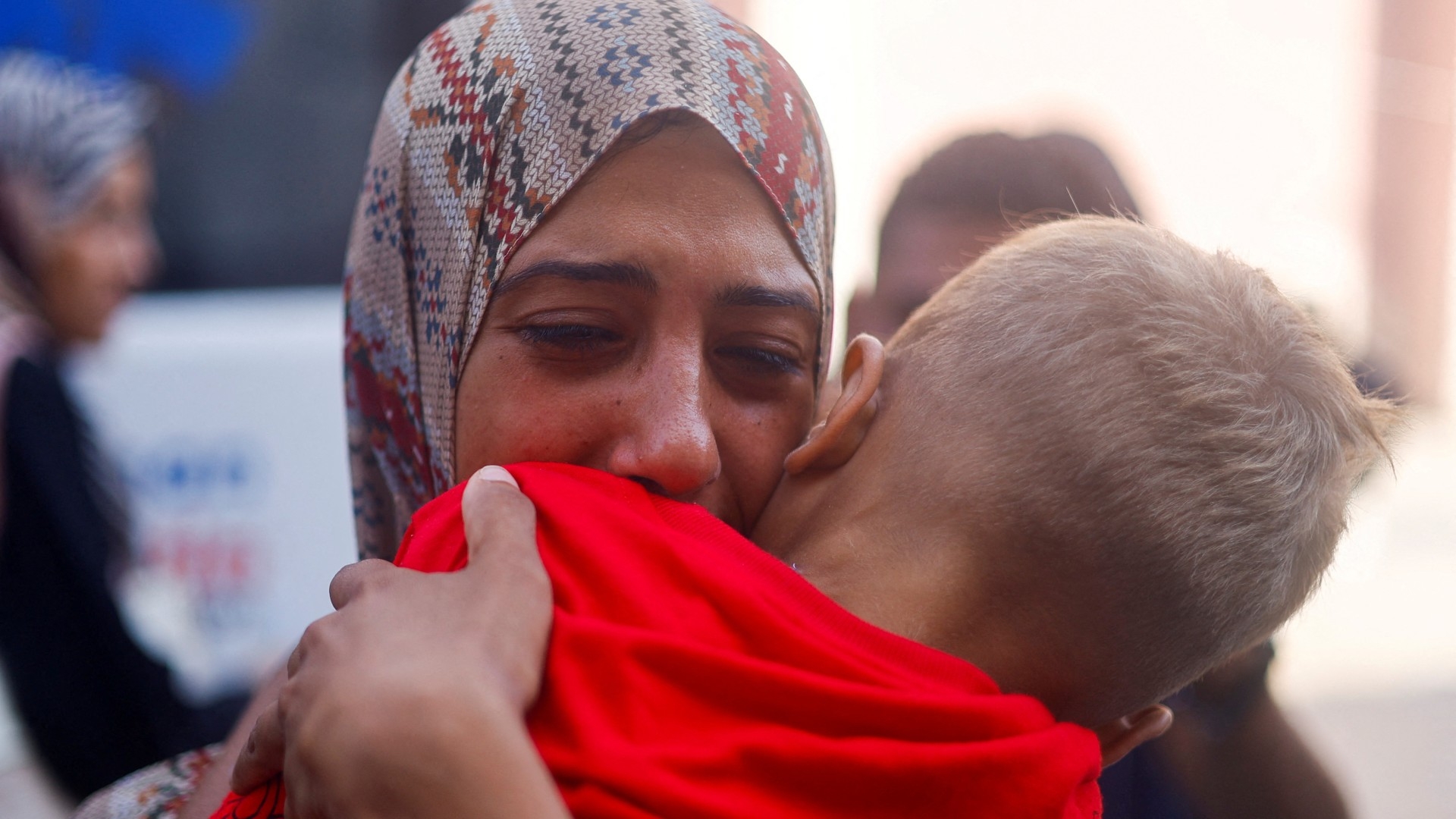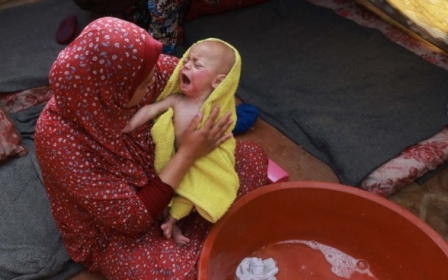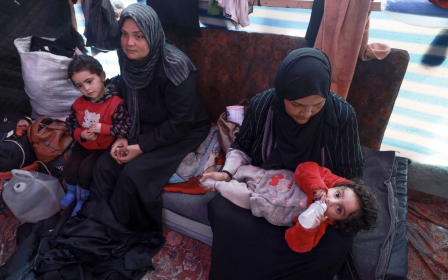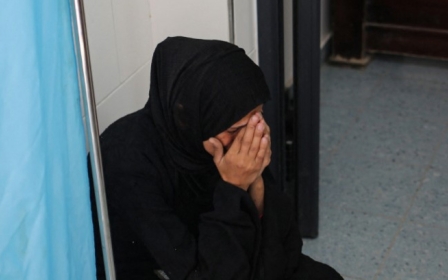War on Gaza: How Israel is stripping Palestinian women of their dignity

Nine months into the massive atrocities being committed by Israel in Gaza, the human toll in the besieged enclave is devastating.
Women and children have borne the brunt of this genocidal war. The statistics are both staggering and tragic: Over 38,000 Palestinians have been killed, 17,000 of whom were children. At least 20,000 children are missing, either lost, disappeared, detained or buried under rubble. Thousands of mothers have been killed, leaving an estimated 19,000 children orphaned.
Those who have survived Israel’s genocidal campaign have been displaced, widowed and left to grapple with a deadly combination of man-made starvation, chronic dehydration, and infectious disease.
Amid relentless bombings and a humanitarian crisis of biblical proportions in Gaza, the impact of the war on reproductive rights will last for future generations. Any attempt to seek accountability for Israel's atrocities should be based on a women's rights approach and grounded on a gendered perspective.
Women and girls generally suffer disproportionately in situations of conflict, as women’s bodies have long been part of the terrain of war. In Gaza, the unspeakable suffering and devastating impacts are being watched by the world in real time.
New MEE newsletter: Jerusalem Dispatch
Sign up to get the latest insights and analysis on Israel-Palestine, alongside Turkey Unpacked and other MEE newsletters
Since 7 October, the assault on Palestinian women’s rights and dignity has taken on new and terrifying dimensions as thousands have become victims of war crimes, crimes against humanity and an unfolding genocide.
The crime of genocide has a gender perspective. Men and boys are killed, while women and girls are subjected to a wider range of violations over a longer period. While the atrocities in Gaza affect both men and women, their impact is gendered and disproportionately affects women.
As they attempt to come to terms with their grief and injuries - with the loss of their children, husbands, parents, relatives, homes, and livelihoods – Palestinian women and girls have been living in an utter and deep horror.
Systematic oppression
In the case brought by South Africa against Israel before the International Court of Justice (ICJ), alleging violations of the Convention on the Prevention and the Punishment of the Crime of Genocide (Genocide Convention), South Africa highlighted a critical but often overlooked element of the offenses committed by Israel: acts of reproductive violence.
South Africa alleged that Israel’s conduct may amount – amongst other provisions of the Genocide Convention – to a violation of Article 2(d), which prohibits "imposing measures intended to prevent births within the group’ with the intent to destroy, in whole or in part, a national, ethnical, racial, or religious group."
In the order for provisional measures issued by the ICJ on 26 January, the ICJ ordered Israel to take all measures within its power to cease-and-desist all acts of genocide, to prevent the commission of such acts, and to preserve evidence oƒf the same.
The ICJ case highlights the egregious, multifaceted and systematic oppression to which Palestinian women are being subjected.
Israel’s military assault on reproductive rights is a central component of how the war on Gaza has disproportionately affected Palestinian women.
More than one million women and girls in Gaza are facing catastrophic hunger, with almost no access to food, drinking water, functioning toilets and running water, according to UN Women. Access to clean water is crucial for pregnant and breastfeeding women, who have higher daily water and calorie requirements.
Follow Middle East Eye's live coverage of the Israel-Palestine war
Without water, Oxfam notes, it is “almost impossible” for these women and girls to manage their menstrual hygiene safely and with dignity. They face extreme challenges amid Israeli colonial policy and siege warfare, lacking not only access to safe delivery services and out-of-stock life-saving supplies, but also, like all civilians in Gaza, protection from bombardment and deadly airstrikes.
Israel’s siege has also limited access to important medications and hygiene products.
Pregnant women are among the most vulnerable. With no safe place left in Gaza, they face life-threatening challenges to accessing care, putting their health and the health of their babies at significant risk.
For women in Gaza today, giving birth is an extremely traumatic experience. Healthcare facilities have been repeatedly targeted, resulting in the near-collapse of the entire system. Ongoing bombardments, mass displacement, and shortages of water, medicine and fuel supplies have wreaked havoc on maternal health services.
The gendered impacts of this war must be addressed through a full investigation of Israel's atrocities, and the perpetrators must be held accountable
Around 50,000 women in Gaza are pregnant, with around 180 giving birth each day. “The dreadful conditions have resulted in increases in miscarriages by up to 300 percent,” a group of UN experts said in a recent report, adding that 95 percent of pregnant and breastfeeding women “face severe food poverty”.
Reem Alsalem, the UN’s special rapporteur on violence against women and girls, notes that “the reproductive violence inflicted by Israel on Palestinian women, newborn babies, infants, and children could be qualified as violations of the human right to life under Article 6 of the International Covenant on Civil and Political Rights”, and as acts of genocide under Article 2 of the Convention on the Prevention of Genocide, several articles of the Convention on the Elimination of All Forms of Discrimination Against Women and Article 6 of the Rome Statute of the International Criminal Court, including “imposing measures intended to prevent births within a group."
Israel’s human rights violations pre-date 7 October, through its longstanding policies of siege and apartheid. A lethal combination of institutionalised domination and deprivation of basic human rights that has characterised the decades-long Israeli regime of apartheid and entrenched military occupation of Palestinian territory has been particularly devastating for women.
There is mounting and convincing evidence that Israel’s tactics constitute a policy, planned, coordinated, and implemented at the highest echelon of the Israeli government and its military establishment. Such policy has in fact resulted, and continue to do so, in the prevention of births amongst Palestinian women in Gaza.
While South Africa’s submissions offer an important first step towards the pursuit of justice for reproductive violence perpetrated as an act of genocide, violations of Palestinian women’s rights warrant immediate - and now overdue - action.
Adjudication of the state-sponsored violence committed against the women of Gaza, as genocide, will make clear this prohibition in contemporary international relations and law. To address the gendered impact of this war, the atrocities committed by Israel in Gaza which fits squarely within the requirements of Lemkinian genocide, must be investigated, charged, and prosecuted from a dynamic, gendered perspective.
This will draw attention to the vicious nature of these crimes and provide symbolic vindication and material reparations for Palestinian women. It will also be a welcome affirmation of the international rule of law in a period when it is badly needed.
Additionally, states with women's rights foreign policy agendas have a particular role in protecting the rights of Palestinian women.
A women’s rights approach to foreign policy should prioritise protecting sexual and reproductive health and rights. These countries can use their leverages in the global community to advocate for responsibility and effective measures to afford the long-suffering women and girls of Gaza- and all of Palestine, indeed - the special protection to which they are entitled in accordance with applicable international law and basic norms of human dignity.
The views expressed in this article belong to the author and do not necessarily reflect the editorial policy of Middle East Eye.
Middle East Eye delivers independent and unrivalled coverage and analysis of the Middle East, North Africa and beyond. To learn more about republishing this content and the associated fees, please fill out this form. More about MEE can be found here.





